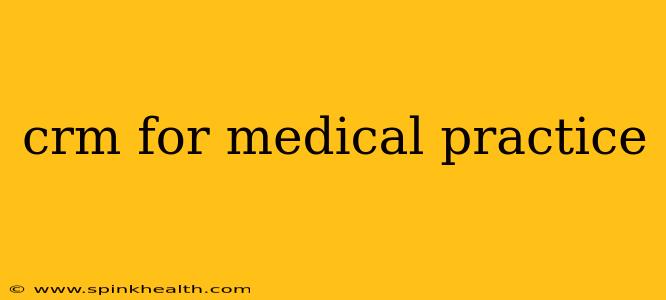The relentless pace of a medical practice often leaves little time for strategic planning and relationship building. Juggling appointments, managing patient records, and ensuring smooth communication can feel overwhelming. This is where a Customer Relationship Management (CRM) system steps in, transforming a potentially chaotic workflow into a streamlined, efficient, and patient-centric operation. But choosing the right CRM for your medical practice requires careful consideration. Let's dive in and explore what makes a medical CRM essential and how to find the perfect fit.
Why is a CRM Important for Medical Practices?
Imagine this: You're a doctor running a busy clinic. You're constantly fielding calls, scheduling appointments, chasing up payments, and trying to remember the details of each patient's unique medical history. It's exhausting, prone to errors, and frankly, leaves little time for the most important aspect: providing excellent patient care.
A medical CRM acts as your central hub, bringing together all patient information, communication logs, appointment scheduling, and billing details in one easily accessible place. This not only saves time and reduces administrative burden but also significantly improves patient care by allowing you to:
- Personalize patient interactions: Access complete patient history at a glance, fostering stronger doctor-patient relationships.
- Improve patient communication: Send automated appointment reminders, follow-up messages, and share important health information effortlessly.
- Streamline administrative tasks: Automate billing, scheduling, and other routine processes, freeing up valuable time for patient care.
- Enhance patient engagement: Offer online appointment booking, patient portals, and other features that improve patient experience.
- Boost revenue: Improve billing accuracy and reduce administrative costs, ultimately increasing profitability.
- Improve patient retention: Stronger communication and personalized care lead to higher patient satisfaction and loyalty.
What Features Should a Medical CRM Have?
Choosing the right CRM involves identifying features crucial for your practice's specific needs. Let's examine some key features to consider:
Secure Patient Data Management: This is paramount. A medical CRM must adhere to HIPAA compliance and ensure the confidentiality and security of patient data.
Appointment Scheduling and Management: Seamless scheduling, automated reminders, and the ability to manage waitlists are essential for efficient appointment flow.
Patient Communication Tools: Integrated communication channels like email, SMS, and even secure messaging portals are vital for effective patient interaction.
Electronic Health Records (EHR) Integration: Seamless integration with your existing EHR system avoids data duplication and streamlines workflows.
Billing and Insurance Management: Features that help manage billing, claims, and insurance processes are critical for financial health.
Reporting and Analytics: Dashboards providing insights into patient demographics, appointment trends, and financial performance are invaluable for informed decision-making.
What are the Different Types of Medical CRMs?
Medical CRMs vary in size, functionality, and pricing. Some cater to small practices, while others are designed for larger multi-location facilities. It's crucial to choose a system that scales with your practice's growth. Cloud-based CRMs are often preferred for accessibility and scalability.
How Much Does a Medical CRM Cost?
The cost of a medical CRM varies considerably depending on the features, the number of users, and the vendor. Some offer subscription-based models, while others might have one-time purchase options. Expect to invest a significant amount initially and ongoing monthly/annual fees. Carefully weigh the cost against the potential benefits and long-term ROI.
Can I Use a General CRM for My Medical Practice?
While some general CRMs might offer some functionality applicable to medical practices, they typically lack crucial features like HIPAA compliance and specialized medical-related tools. Choosing a CRM specifically designed for healthcare is highly recommended to avoid legal issues and ensure optimal performance.
How Do I Choose the Right Medical CRM for My Practice?
Selecting the right CRM is a significant decision. Consider these factors:
- Practice size and needs: A small practice will have different needs than a large multi-specialty clinic.
- Budget: Set a realistic budget and compare pricing models from different vendors.
- Integration with existing systems: Ensure compatibility with your EHR, billing software, and other vital systems.
- HIPAA compliance: Verify that the CRM meets all HIPAA security and privacy regulations.
- User-friendliness: Opt for a system that is intuitive and easy for your staff to use.
- Vendor support: Choose a vendor that offers reliable technical support and training.
Choosing the right CRM for your medical practice is an investment in efficiency, improved patient care, and long-term success. Take the time to thoroughly research options, demo several systems, and choose the one that best aligns with your unique needs and goals. The result? A more organized, efficient, and ultimately more rewarding medical practice.

